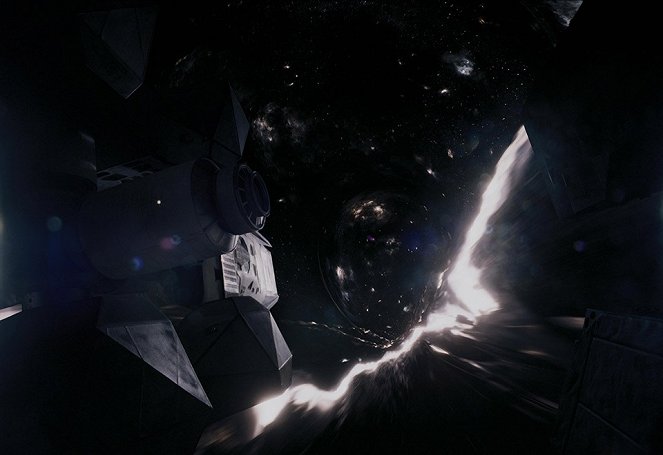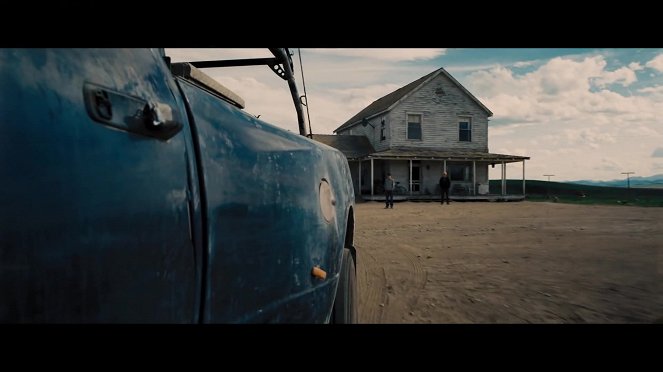Reżyseria:
Christopher NolanZdjęcia:
Hoyte van HoytemaMuzyka:
Hans ZimmerObsada:
Matthew McConaughey, Anne Hathaway, Jessica Chastain, Matt Damon, Mackenzie Foy, Wes Bentley, David Gyasi, Michael Caine, Casey Affleck, John Lithgow (więcej)VOD (4)
Opisy(1)
Historia grupy badaczy, którzy dzięki nowo odkrytemu tunelowi czasoprzestrzennemu pokonują granice do tej pory przekraczające ludzkie możliwości podróżowania w innym wymiarze. Film oparty jest na teorii naukowej opracowanej przez fizyka z Caltech Kipa Thorne'a. (Warner Bros. PL)
Materiały wideo (28)
Recenzje (19)
I strongly believe that when I watch Interstellar a second time, free of any of the hype, I will be able to enjoy this professionally made and above-average sci-fi movie enough to give it four stars… but I’d be lying to myself if I didn’t admit that it was quite a big disappointment. And I’m really sorry about it, because there wasn’t any other film this year that I was more excited about. The biggest problem was the last half-hour, it wanted to be smart and ambitious, but I thought it was actually dull and banal. Really, all that exposition in the middle wasn’t original at all. If only the characters stopped talking so much and let the viewers figure things out for themselves, it would have been very successful and literally, and surprisingly, emotionally cold (the emotional peak comes undoubtedly somewhere around the middle, when they watch the messages). On top of that, there are some weird decisions and logically contradictory moments, which really harms such an ambitious film like this (after realising that time passes more slowly in the first planet due to its proximity to a black hole, these leading scientist really didn’t think of the consequences that it could have on what Dr Miller was supposed to do, etc.?). But Interstellar has many things that I liked. There are scenes that made me hold my breath or that captivated me. Excellent music, great Matthew. But from the whole, I’m still undecided, sigh!
()
Spoilers ahead. McConaughey’s cowboy longing to discover the unknown heads out into space not only to gain knowledge (mainly of himself), but also in pursuit of the same goal that the first American settlers (and protagonists of the first sci-fi movies) had – to uncover the unknown and to colonise distant lands. Interstellar dusts off Americans’ mythological presentation of themselves as those who bring their enterprising spirit and common sense to bear in establishing civilisational order wherever there are acceptable conditions for such an endeavour. Here the crossing of frontiers (and horizons) is far more spectacular than in westerns, because instead of nature, one has to contend with technology and space (this is foreshadowed in the exposition, when the characters corral an out-of-control drone instead of wild horses). Victory is not a matter of one side defeating the other, but of establishing a harmonious union between man and space. ___ If the transfer of the founding American mythology into interstellar space offers a broad range of interpretations with respect to the current state of America’s self-confidence as a nation, the narrative enhancement inspires both awe and embarrassment. The complicated narrative structure involves a rather simple story in which everything is carefully told and fully explained (unlike the less materialistic films of Tarkovsky and Malick, which remain broadly open to interpretation). The excessive complexity of the ways in which the characters are led to their goal and the ways that they are given information creates a false impression of sophistication. The complexity of the form is somewhat counterproductive in light of the parallel effort to achieve maximum clarity and comprehensibility. The film devotes too much space to explaining itself to us. The Nolan brothers’ primary interest in structure has the consequences of clumsily written characters and their utilitarian usage. They are merely pieces of a bigger puzzle. They do not exist outside of their place in the structure. ___ But as a dispassionate designer who masterfully uses motifs from myriad sci-fi movies and books (Armageddon, Contact, The Abyss, Close Encounters of the Third Kind), Nolan has few equals. When he begins to build one of the major scenes, subtly at first and gradually with more and more intensity, it is like listening to a symphony with perfectly tuned and orchestrated instruments. He doesn’t need to resort to his favourite parallel montage technique – on the watery planet, the ticking of the watch incorporated into the music is enough to connect the two storylines. This scene develops the central motif of time, most strikingly illustrated by the mother ship Endurance, whose circular structure with twelve capsules is reminiscent of an analogue clock. The concept of time itself determines the direction and dynamics of the narrative. Time is a source of most of the narrative conflicts. It serves as a substitute for “evil” in a more tangible form, which is what a more conventionally structured narrative would fall back on. The good characters struggle with it; the bad ones succumb to it (Dr. Mann goes mad). Only bringing time under control brings victory in the end. ___ However breathtaking the long build-up to the climax and its slow subsidence may be, we are presented with the question of whether it justifies the complicated narrative structure with the dilation of time, wormholes and black holes. Because the film cannot conceal the fact that Nolan designed everything in relation to this connecting sequence. Not because of grand ideas and carefully depicted characters, but only for the joy of engineering it. The great films of world cinema that we now consider classics offer more than just perfect structure. 85%
()
(mniej)
(więcej)
It's always been like that. Always. For every film that has (re)defined the sci-fi genre, there have been widely conflicting responses; only time, the fairest judge, has helped resolve the dilemma of a work' immortality. This applied even to Kubrick's Odyssey, which was loved in its time by hippie circles but reviled by critics and mainstream audiences. But Nolan is like expensive wine, if you like it and you know that it makes you feel good, you will forgive it a little bit of tartness and you will be happy to come back to it. He’s not the cheap swill that delight the bums at the train station, but a proper vintage Bordeaux. Cheap swill are most of today’s movies, especially the innumerable comic book adaptations that have already bored the gourmands. Nolan can still surprise, and as he gets older, his films become more epic, more narratively sweeping, in short, more cinematically ambitious, while focusing more on the visceral feelings of individuals, bringing the simple human dimension to the fore in a Spielbergian way (see the third Batman). But I still wasn't prepared for what was coming. Interstellar is so ambitious and bold in its message, in its rarely seen narrative structure, that it will either hit you like a ton of bricks or, on the contrary, make you feel uplifted. It depends on your nature. And I could go on with superlatives, such as the original and unprecedented concept of the gradual destruction of our ecosystem, all from the point of view of one family (similar to Spielberg's War of the Worlds or Close Encounters of the Third Kind), breathtaking space compositions, while maintaining a serious scientific dimension and the laws of physics (though this is for a longer discussion), and all that while keeping the narrative intimate and thought-provoking. Nolan is a man with a big heart, and those who are afraid of honestly conveyed emotions, thoughts revolving around the fate of the family and the weight of the responsibility to bring a child into the world, may not appreciate this. But would it be presumptuous of me to say that at least half of the positive impression of the film in my eyes was made by Matthew McConaughey himself? An actor so malleable, with such a breadth of emotions, it's breathtaking. Matthew, if I see you one more time showing your six-pack in the company of some second rate bird like in one of those forgotten comedies you (thankfully) have left behind, I’ll smack you in the head with one of your surf boards.
()
There is power in simplicity, even if the monstrous epic tempts many viewers to seek complex interpretations. The power of Nolan's narrative lies in confronting the fundamental life decisions of a handful of people about the future of homo sapiens at the expense of personal interests and desires. Let us take those scientific lessons, limited to the described tables, which we do not understand anyway, as a glittering decoy toward a dead end. The sweeping cinematography and roaring music are meant to give the impression of a major space adventure, and yet, thanks mainly to the terrific cast, it's really one big cliché about a father-daughter relationship where the question is whether the journey through the wormhole will help them see each other again. I really didn't expect myself to be so sensitive and that at the end of it, I would cheer for it wholeheartedly. It was actually nice to get something completely different in the movie theater than I originally expected and that the whole colossus worked. This is particularly true when I sat in front of the screen with a certain amount of skepticism thanks to the diametrically opposed responses. [But I don't deny that everything negative you read about the film is true. And yet so are the positives.]
()
The secret of Nolan’s success lies in his ability to disguise his inability to maintain the logical and emotional continuity of the narrative in parallel storylines in a disarming and, at the same time, overly dramatic manner. This weakness drags down the entire second half of Interstellar, which will drill such a hole in your head that you are forced to switch to the passive mode of “a great blockbuster experience” – without being bothered by the fact that the editor doesn't know what he’s doing. The movie is full of self-serving dramatic scenes that are of little relevance to the story as a whole, by which I mean the epic docking with the damaged rotating station and the burning cornfield with an angry Casey Affleck (WTF?) on the opposite side of the galaxy. And by dysfunctional logical and emotional continuity, I mean cutting from space to Earth (where we don’t know what’s going on and to which everyone is running), which unnecessarily draws attention away from the key twists of the cosmic plot. It looks so terribly EPIC and uses such magnificent music that Nolan surely knows what he’s doing here...right? No, in my opinion, he does not. ___ But let’s talk about the first half of Interstellar, which seems to be a different film entirely – it is smooth, deliberate and sensitively edited, outlining beautiful thoughts about TIME (which, along with health, is the most valuable thing we have). Because of that, this half of the film is the most elaborate and magical sci-fi revelation in many years. I fell in love with Interstellar in the scene involving greetings after returning from the watery planet, which is something I don’t think I have ever written about any film before. And there it should have ended, and Nolan and his people should have made a completely rewritten sequel a decade later, after they’ve grown up and learned to perceive things in context, together with proper editing. Then, ideally by dividing it into two sensitively linked films, one of which would take place in space and the other on Earth, they could have made Interstellar into a milestone in the history of the science fiction genre, a dignified successor to Kubrick.
()
Galeria (231)
Photo © Warner Bros. Pictures


